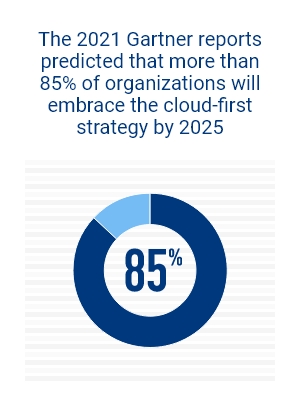Critical Capabilities of Enterprise Integration Platform as a Service
- Featured Insights
- February 20, 2023
With digital capabilities becoming the norm, delivering digital experiences for the customer is a tough task. Most modern organization bank are expected to deliver these experiences seamlessly.
One of the major problems these organizations face is cloud integration.
The 2021 Gartner reports predicted that more than 85% of organizations will embrace the cloud-first strategy by 2025. Indeed, without cloud-native architectures, organizations will not be able to fully execute their digital initiatives.
However, without proper integration, different systems and applications may not be able to share data, leading to data silos, redundant data, and manual data entry. This can result in inefficiencies, errors, and increased costs.
This is where Enterprise Integration Platform as a Service (EiPaaS) comes into the picture. EiPaaS aims to solve the problem of integrating various systems and data sources within an organization and offers organizations a cloud-native architecture to optimize, execute, and scale their digital strategies most effectively.


What is EiPaaS?
Enterprise Integration Platform as a Service (EiPaaS) is a cloud-based platform that enables organizations to integrate their various systems, applications, and data sources. The platform provides a set of tools and services for connecting, managing, and governing the flow of data between different systems, both within the organization and with external partners.
The main difference between EiPaaS and traditional integration solutions is that EiPaaS is delivered as a service, typically via the cloud, and it eliminates the need for organizations to build and maintain their own integration infrastructure. This allows organizations to focus on their core business and leave the integration to the experts, while at the same time reducing infrastructure costs and scaling ROI with minimal investments.
Why do we need EiPaaS?
EiPaaS solutions can be used for a variety of integration scenarios, such as data integration, application integration, process integration, and API management. They can also support different integration styles, such as real-time, batch, and event-driven. It can also provide a wide range of functionalities, such as data mapping and transformation, business process management, monitoring and analytics, and security and governance.
It provides a robust platform for automating business processes and workflows as part of an overall enterprise automation architecture. It enables organizations to integrate their various systems and applications, and automate the flow of data between them, thus reducing manual effort and improving efficiency.
EiPaaS can be an important component in RPA (Robotic Process Automation) projects, as it provides a unified platform for automating business processes and workflows across multiple systems. By using EiPaaS in conjunction with RPA, organizations can achieve a more comprehensive automation solution that covers both front-end and back-end processes.
An automation mindset is crucial for organizations that want to take full advantage of EiPaaS and RPA. It provides a powerful platform for automating business processes, but it is up to organizations to identify the processes that can be automated and to plan and execute automation projects effectively.

Critical Capabilities of EiPaaS

Scalability
Security
Reliability
Flexibility
Ease of use
Support for multiple protocols and formats
API management
Cloud readiness
Hybrid connectivity
Benefits of EiPaaS
Faster integration
Increased efficiency
Improved data access and visibility
Reduced costs
Multi-Tenancy
Self-Service Integration
Support for industry standards

Conclusion
EiPaaS provides a comprehensive cloud platform for enterprise automation and integration, making it an ideal choice for organizations that want to improve efficiency, reduce costs, and adopt an automation mindset.
When combined with RPA, EiPaaS can provide a complete solution for automating business processes and workflows, helping organizations to achieve their digital transformation goals.